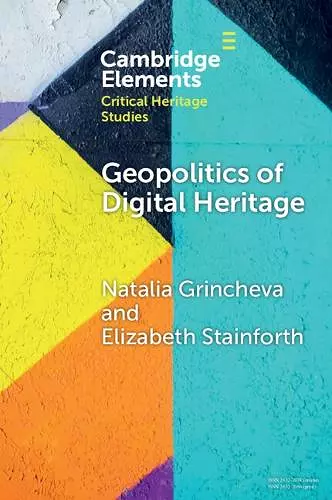Geopolitics of Digital Heritage
Natalia Grincheva author Elizabeth Stainforth author
Format:Paperback
Publisher:Cambridge University Press
Published:8th Feb '24
Currently unavailable, and unfortunately no date known when it will be back

The Element positions digital heritage as a new arena of geopolitical struggle and focuses on strategies of geopolitical space production.
Geopolitics of Digital Heritage analyzes and discusses the political implications of the largest digital heritage aggregators across different scales of governance. The Element employs an interdisciplinary approach and combines critical heritage studies with the study of digital politics and communications.Geopolitics of Digital Heritage analyzes and discusses the political implications of the largest digital heritage aggregators across different scales of governance, from the city-state governed Singapore Memory Project, to a national aggregator like Australia's Trove, to supranational digital heritage platforms, such as Europeana, to the global heritage aggregator, Google Arts & Culture. These four dedicated case studies provide focused, exploratory sites for critical investigation of digital heritage aggregators from the perspective of their geopolitical motivations and interests, the economic and cultural agendas of involved stakeholders, as well as their foreign policy strategies and objectives. The Element employs an interdisciplinary approach and combines critical heritage studies with the study of digital politics and communications. Drawing from empirical case study analysis, it investigates how political imperatives manifest in the development of digital heritage platforms to serve different actors in a highly saturated global information space, ranging from national governments to transnational corporations.
'This book takes critical heritage studies in new, exciting and important directions. It introduces a domain of enquiry, digital heritage geopolitics, via fascinating examples that move from the city-state of Singapore, to the continental, to Google's global ambitions. Grincheva and Stainforth's important study provides us with a valuable foundation for understanding how the capturing and codifying, ordering and (re)presenting of culture as data now takes on geopolitical dimensions, and why that matters in a digitally connected and competitive world.' Tim Winter, Professor, National University of Singapore, Author of Geocultural Power (Chicago) and The Silk Road: connecting histories and futures (Oxford)
'This book systematically updates traditional bases of heritage studies, international politics, and even museum studies to include state and corporate projects that configure new geopolitics of cultural power and control. Heritage aggregation is the overarching theme here and it is masterfully revealed in case studies from Singapore, Australia, Europe, and Google. The Google case is especially riveting, but each example expertly lays out the mechanisms and the reach of today's digitalized world. Short, to the point, and definitely important.' Christine Sylvester, Professor Emeritus of Political Science at University of Connecticut
'Through its exploration of how culture is collected, organised and valued in the realm of digital heritage, this insightful and clearly written book deals with some of the key issues facing heritage scholarship today. Skilfully weaving together literature from critical heritage studies, digital humanities and governmental theory, the book draws on four case studies of digital aggregators, to develop a broader understanding of how digital heritage shapes and is shaped by political and ideological agendas at multiple scales. It will stand as a key reference point, both reflecting recent advances in digital heritage scholarship, and by providing a platform for further questioning on the future of the field.' David C. Harvey, Professor, Aarhus University, Denmark
'Geopolitics of Digital Heritage is a brilliant and concise overview of a crucial question for heritage scholars - who controls the digital archive? Offering a rich theoretical base for the analysis, as well as 4 detailed - and global - case studies, the book is an important intervention. It reveals the power dynamics underpinning digital heritage infrastructure and offers a starting point for the public to question the politics and commercial imperatives associated with state and corporate control of culture.' Dave O'Brien, Professor of Creative & Cultural Industries, University of Manchester, UK
'The path-breaking Element, Geopolitics of Digital Heritage, opens the conversation on the geopolitical dimension of digital heritage policy and politics. While the role of digitalization of cultural heritages has gained increasing attention, this is the first work to view practices and policies through a geopolitical lens. Digital politics have become a new political arena where information is a major weapon of power and control. The scholars present four case studies with rich research detail and a probing analysis to demonstrate how state and non-state actors are aggregating and curating digital cultural data in pursuit of their geopolitical agendas to shape collective public memories, national images, and cultural consumption. Not all is for the better; the authors raise concerns beyond cultural competition and instrumentalization to dangers of global monopolization, Disneyfication, commodification and digital imperialism.' Rhonda Zaharna, Professor of Global Communications, American University, USA
ISBN: 9781009182089
Dimensions: 228mm x 150mm x 6mm
Weight: 160g
102 pages